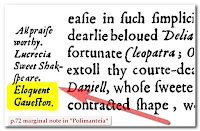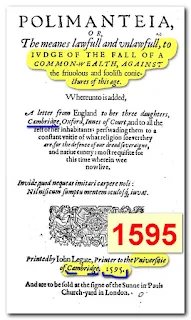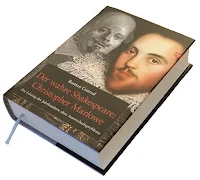NO INTERNAL COHERENCE
Marlowe's and Drayton's "Gaveston"
and Shakespeares "Lucrece" in 1594?
Within a year after the appearance of Shakespeare's early epic poem "Lucrece" (0p.2- 1594) a book entitled "Polimanteia" (1595) of an anonymous author ("W.C.") refered to literary <---Shakespeare in a marginal note (s. Faksimile left) saying that "
(1 )All praise worthy.
(2) Lucretia Sweet Shak-speare.
(3) Eloquent Gaveston."
The sentence "All praise worthy." alone makes no sense , but only with the subsequent reference to two separate expressions: 2 Lucrecia Sweet Shakespeare , and 3 Eloquent Gaveston.
An obscure situation?!
In plain language: All praise worthy a poem "Lucrecia", written by a (sweet!) poet named Shak-speare, who is the eloquent Gaveston [alias Marlowe]. -- Consider that in the same year 1594 not only Shakespeare's "Lucrece" but als Marlowe's "Edward II"(1594) was printed in which Gaveston is the leading character.
(Consider that also Michel Drayton's central figure "Gaveston" in his Poem "The Legend of Piers Gaveston, his life, death and fortune" appeared in 1594 - s.video and blog 323/324)
.
Academic Shakespeare experts never even seem to have tried to explain, ......
a) why one of the very first mentioning of the "literary" Shakespeare with his figure "Lucrece" is so closely connected with the figure of "Gaveston" of Christopher Marlowe's Edward II in "Polimanteia" and
b) who is the author of "Polimanteia", asking the reader on "the title page" to "judge his fall".
a) why one of the very first mentioning of the "literary" Shakespeare with his figure "Lucrece" is so closely connected with the figure of "Gaveston" of Christopher Marlowe's Edward II in "Polimanteia" and
b) who is the author of "Polimanteia", asking the reader on "the title page" to "judge his fall".
I contend that no serious Shakespeare expert, who is familiar with "Polimanteia", and knows about Marlowes fall, will ignore the overwhelming evidence that the author W.C. cannot have been an ordinary, unknown clergy man ->William Cowell or writer -> William Clerke, but that he clearly identifies himself throughout the book as an outstanding exceptional wit, as the concealed author Christopher Marlowe alias Shakespeare/Drayton/W:C:/ etc... (for those interested in details I, must refer to chapter 11 of the german book "The true Shakespeare: Christopher Marlowe)
↑↑ English Marlowe-Shakespeare theory
↑↑ the German Marlowe/Shakespeare Book
VIDEOS – Complete Video Archive:
OPEN —> Heading--> Home -->Videos -- Shorts -- Posts
->Popular





